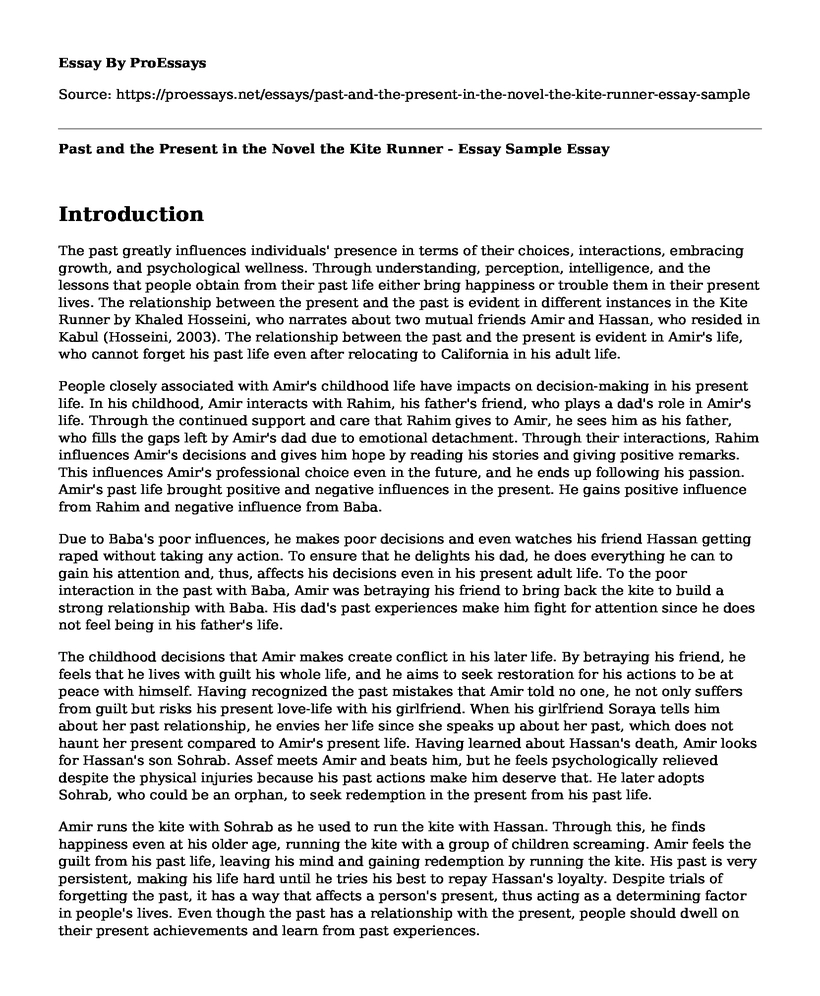Introduction
The past greatly influences individuals' presence in terms of their choices, interactions, embracing growth, and psychological wellness. Through understanding, perception, intelligence, and the lessons that people obtain from their past life either bring happiness or trouble them in their present lives. The relationship between the present and the past is evident in different instances in the Kite Runner by Khaled Hosseini, who narrates about two mutual friends Amir and Hassan, who resided in Kabul (Hosseini, 2003). The relationship between the past and the present is evident in Amir's life, who cannot forget his past life even after relocating to California in his adult life.
People closely associated with Amir's childhood life have impacts on decision-making in his present life. In his childhood, Amir interacts with Rahim, his father's friend, who plays a dad's role in Amir's life. Through the continued support and care that Rahim gives to Amir, he sees him as his father, who fills the gaps left by Amir's dad due to emotional detachment. Through their interactions, Rahim influences Amir's decisions and gives him hope by reading his stories and giving positive remarks. This influences Amir's professional choice even in the future, and he ends up following his passion. Amir's past life brought positive and negative influences in the present. He gains positive influence from Rahim and negative influence from Baba.
Due to Baba's poor influences, he makes poor decisions and even watches his friend Hassan getting raped without taking any action. To ensure that he delights his dad, he does everything he can to gain his attention and, thus, affects his decisions even in his present adult life. To the poor interaction in the past with Baba, Amir was betraying his friend to bring back the kite to build a strong relationship with Baba. His dad's past experiences make him fight for attention since he does not feel being in his father's life.
The childhood decisions that Amir makes create conflict in his later life. By betraying his friend, he feels that he lives with guilt his whole life, and he aims to seek restoration for his actions to be at peace with himself. Having recognized the past mistakes that Amir told no one, he not only suffers from guilt but risks his present love-life with his girlfriend. When his girlfriend Soraya tells him about her past relationship, he envies her life since she speaks up about her past, which does not haunt her present compared to Amir's present life. Having learned about Hassan's death, Amir looks for Hassan's son Sohrab. Assef meets Amir and beats him, but he feels psychologically relieved despite the physical injuries because his past actions make him deserve that. He later adopts Sohrab, who could be an orphan, to seek redemption in the present from his past life.
Amir runs the kite with Sohrab as he used to run the kite with Hassan. Through this, he finds happiness even at his older age, running the kite with a group of children screaming. Amir feels the guilt from his past life, leaving his mind and gaining redemption by running the kite. His past is very persistent, making his life hard until he tries his best to repay Hassan's loyalty. Despite trials of forgetting the past, it has a way that affects a person's present, thus acting as a determining factor in people's lives. Even though the past has a relationship with the present, people should dwell on their present achievements and learn from past experiences.
Reference
Hosseini, K. (2003). The kite runner. Penguin
Cite this page
Past and the Present in the Novel the Kite Runner - Essay Sample. (2023, May 19). Retrieved from https://proessays.net/essays/past-and-the-present-in-the-novel-the-kite-runner-essay-sample
If you are the original author of this essay and no longer wish to have it published on the ProEssays website, please click below to request its removal:
- William Shakespeare's Venus and Adonis: Red and White
- A Literary Essay Example on The Odyssey by Homer
- Essay Example on Interpretation of a Fiction Story: A Rose for Emily
- Critical Essay Sample on Mr. Antolini's Advice in "Catcher in the Rye"
- Essay Example on 3 Poem Types: Theme, Form, Figurative Language
- Monkey's Paw Brings Disaster to White Family - Essay Sample
- Essay Example on Pi's Unwavering Faith: A Tale of 3 Religions







